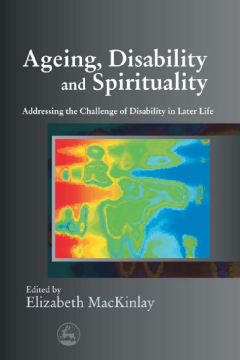
BOOK
Ageing, Disability and Spirituality
Elizabeth MacKinlay | Alan Niven | Christopher Newell | Lawrence McNamara | Kirstin Robertson-Gillam | Ruwan Palapathwala | Malcolm Goldsmith | Lorna Hallahan | Rosalie Hudson | John Swinton | Dagmar Ceramidas | Eileen Mary Glass | Matthew Anstey | Christine Bryden
(2008)
Additional Information
Book Details
Abstract
This collection examines theological and ethical issues of ageing, disability and spirituality, with an emphasis on how ageing affects people who have mental health and developmental disabilities.
The book presents ways of moving towards more effective relationships between carers and older people with disabilities; ways in which to connect compassionately and beneficially with the person's spiritual dimension. The contributors highlight the importance of recognizing the personhood of all people regardless of age and of disability, whatever form it takes. They identify factors inherent in personhood and provide ways of affirming and promoting spiritual well-being for older people with disabilities.
Valuable reading for practitioners in aged care, healthcare, chaplaincy, social and pastoral care, and diversional therapists, this book will also be of interest to older people, their families and friends.
The authors come from several academic and practice disciplines - theology, nursing, social work, ethics, recreation and diversional therapy and psychology. Importantly, the book also includes chapters written or co-written by persons with dementia and disability themselves, and incorporates the voices of ageing persons with disability via practice examples and quotes from qualitative research. As a result, the book presents multiple viewpoints on how ageing, disability and spirituality are experienced as individuals as care partners, care professionals, and the wider community.
Dementia Journal
This book succeeds in challenging the reader to see dementia in a different framework, one in which there is profound wisdom about personhood and our values.'
The Church Times
'This book is a series of essays focusing on the feelings of older people later in life and how relationships are affected by disability...Elizabeth and her co authors have together looked at many different ways in trying to describe how those with disability communicate their personal spirituality and feelings about life.
NAPA
There is much that disabled and non-disabled people can learn from each other. This book goes a considerable way towards ensuring that this happens.
Plus, Quarterly Magazine of Christian Council on Ageing
Table of Contents
| Section Title | Page | Action | Price |
|---|---|---|---|
| PART I | |||
| 2. The South African context: The double story | |||
| 3. Where we are coming from | |||
| 4. Community development effectiveness – how do we know we know? | |||
| PART II: INTENTIONS AND IDEAS | |||
| 5. Reaching for a social reconstruction tradition | |||
| 6. Reconstructing frameworks for practice | |||
| PART III: AN ASSEMBLAGE OF STORIES AND POSSIBILITIES | |||
| 7. Accompanying, horizontal learning and structuring: political practice and the Southern Cape Land Committee | |||
| 8. Action learning and research, food security and Abalimi Bezekhaya | |||
| 9. Staged place-based community development and the Hantam Community Education Trust | |||
| 10. From marginalisation to destiny: anger, violence and community protest in South Africa | |||
| 11. Informal housing and community development: A historical and human rights approach | |||
| 12. ‘Seeing like a state’ and neo-colonial cooperative development within South Africa | |||
| 13. Interlude: In dialogue with Es’kia—the decolonial turn | |||
| 14. In conclusion: Promissory reflections |
